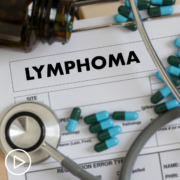What Are Potential Comorbidities in Follicular Lymphoma?
What Are Potential Comorbidities in Follicular Lymphoma? from Patient Empowerment Network on Vimeo.
What can follicular lymphoma patients expect for potential comorbidities? Cancer patient Lisa Hatfield and expert Dr. Sameh Gaballa from Moffitt Cancer Center explain some common health conditions that follicular lymphoma may experience.
See More from START HERE Follicular Lymphoma
Related Resources:

|

|

|
Transcript:
Lisa Hatfield:
What are comorbidities? Comorbidities are additional health conditions that may coexist with follicular lymphoma. These can be pre-existing or develop as a consequence of the lymphoma itself or its treatments. Recognizing and managing these comorbidities is crucial for comprehensive patient care. While lymphoma is a blood cancer, it can influence various organ systems, potentially leading to comorbidities such as cardiovascular issues, infections, or autoimmune disorders.Listen as Dr. Sameh Gaballa from Moffitt Cancer Center discusses the risk of secondary cancers, which are a type of comorbidity, for follicular lymphoma.
Dr. Sameh Gaballa:
So that’s always a concern, and it depends on what treatment they had. So chemotherapy that can potentially damage DNA can lead to second malignancies, including things like acute leukemia. Luckily, that’s not a high risk. That’s a rare side effect from some of those chemotherapies. Some of the pills can do that as well. Something like lenalidomide (Revlimid) can sometimes have second malignancies. But we’re talking about rare incidences, and the benefits usually would outweigh the risks. But it’s not with all treatments, meaning some of the other immune therapies that do not involve chemotherapy would not typically be associated with some of those second malignancies. So it just really depends on what exactly the treatment you’re getting.
Lisa Hatfield:
As Dr. Gaballa says, often secondary cancers are rare incidences and the benefits of treating your follicular lymphoma usually outweighs the risk of not treating or developing a comorbidity. Before deciding on a treatment option, be sure to discuss with your healthcare team about the long-term risks of comorbidities and management of those comorbidities. This may help you narrow down treatment choices or prepare for the future.
Sources:
- https://powerfulpatients.org/2023/10/24/follicular-lymphoma-disease-transformation-and-secondary-cancer-risk/
- https://www.mylymphomateam.com/resources/conditions-related-to-lymphoma









